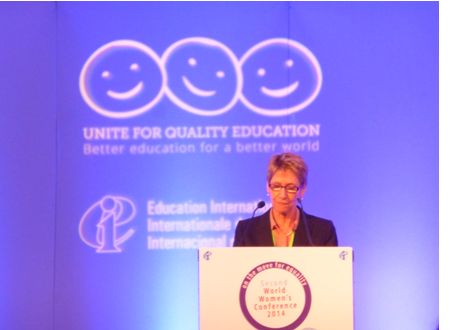The Second World Women’s Conference, organised by Education International took place in Dublin between 7 and 9 April 2014. The Education and Solidarity Network assigned its policy officer to discuss pupil and teacher health in schools, an essential component of quality education, with other participants at the event.
The Second World Women’s Conference, organised by Education International took place in Dublin between 7 and 9 April 2014. The Education and Solidarity Network assigned its policy officer to discuss pupil and teacher health in schools, an essential component of quality education, with other participants at the event.

{C}
On the agenda: lectures and workshops aimed at discussing the place of women in education trade unions and their role in education, with particular regard to gender issues. The goal for 2014: putting words into action. Some 400 education sector trade unionist delegates, 70% of whom were women, came from all over the world to discuss their personal experiences and suggest solutions for quality education.
The EI international campaign “Unite for Quality Education” was a key focus of the conference. It focuses on three fundamental areas: universal access to quality teachers; modern teaching resources and tools; and safe environments conducive to teaching and learning.
EI President, Susan Hopgood noted in her various contributions that efforts should be made to guarantee girls “quality education and not just a seat in a classroom”. She added: “Quality education is fundamental to the achievement of all other development goals including […] health, nutrition […]. “

{C}
Susan Hopgood’s words reflect the Education and Solidarity Network’s deeply-held belief that: Although teachers and pupils must be healthy to ensure quality education, education and the mobilisation of education professionals are also part of the solution for improving health. In this context, we were able to emphasise our added value to teachers and other education workers.
Through a number of interviews conducted at the event, we noted growing interest among trade unions in health issues and the various actions undertaken: health education and prevention campaigns; studies on occupational diseases among teachers in order to have these recognised; suggesting and designing health protection systems for teachers; mobilising in defence of social protection systems etc. In the coming months, the Network will look further into the surveys initiated in Dublin in order to gain a fuller understanding of education union initiatives on health issues.
Dublin also provided an opportunity to address the issue of recruiting young people, a major challenge for many trade union organisations in countries with ageing populations. The Education and Solidarity Network took part in various workshops on the subject. By sharing good practice, it was possible to identify original approaches, in particular that of providing young people with a space in trade unions in which they are represented and are able to discuss relevant issues, thus ensuring that their specific problems are better understood and addressed. Various proposals confirmed the relevance of our “Virtual Community of Young Education Professionals” project which aims to offer young people a virtual space for discussion and solidarity.
The conference was therefore very valuable and revealed a number of concrete avenues of work both for the Network and education unions!




